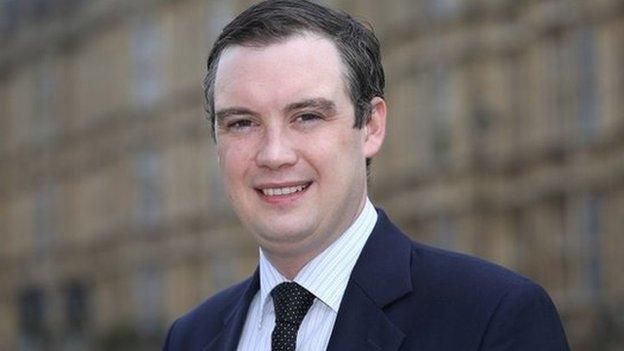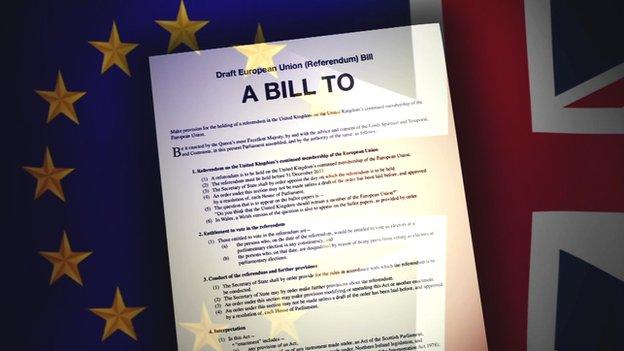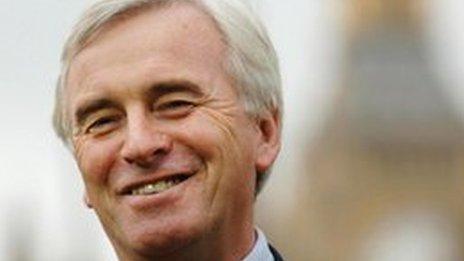Lib Dem Andrew George tops private members' bill ballot
- Published
And the winners are... Lindsay Hoyle names MPs in private member's bill ballot
Lib Dems Andrew George and Michael Moore came top in the annual ballot to determine which backbenchers get to propose new laws to Parliament.
The vote decides which 20 MPs get priority for their selected private members' bills and in what order.
Those at the top of the list get more parliamentary debating time.
The top ranked Tory was Bob Neill, who was third. He said he would bring back the bill for an EU referendum in 2017.
Conservative MP James Wharton, who topped last year's ballot, saw his bill enshrining in law a commitment to hold a referendum on whether the UK should be in the EU pass through the House of Commons, but fall after it ran out of time in the House of Lords.
It was widely predicted that the top Conservative in this year's ballot would seek to propose a similar bill calling for a referendum on the UK's membership of the EU in 2017 - if it passed through the Commons again, it could be forced into law even if the Lords blocked it again.
David Cameron, who has said the Conservatives are committed to holding a public vote in 2017 if they win the next election, strongly backed Mr Wharton's bill.
Mr Neill, a Conservative Party vice chairman, told the BBC he did not think the bill was a waste of time, given that it was only likely to have an impact if the Conservatives had a majority after the next election.
He said: "On the contrary I think it's hugely important that the British people know that there is on the statute book, a piece of legislation that will require a referendum once we've had the chance to have a sensible renegotiation... and then we can put a new deal to the British people."

The full top 20 in the ballot
1. Andrew George, Liberal Democrat, St Ives
2. Michael Moore, Liberal Democrat, Berwickshire, Roxburgh and Selkirk
3. Robert Neill, Conservative, Bromley and Chislehurst
4. Richard Bacon, Conservative, South Norfolk
5. Jeremy Lefroy, Conservative, Stafford
6. Clive Efford, Labour, Eltham
7. Sarah Teather, Liberal Democrat, Brent Central
8. Julian Sturdy, Conservative, York Outer
9. Mark Spencer, Conservative, Sherwood
10. Jonathan Evans, Conservative, Cardiff North
11. Ian Mearns, Labour, Gateshead
12. Dan Jarvis, Labour, Barnsley Central
13. Jake Berry, Conservative, Rossendale and Darwen
14. Andrew Bingham, Conservative, High Peak
15. Yvonne Fovargue, Labour, Makerfield
16. John Hemming, Liberal Democrat, Birmingham Yardley
17. Christopher Chope, Conservative, Christchurch
18. Mark Lazarowicz, Labour, Edinburgh North and Leith
19. David Davis, Conservative, Haltemprice and Howden
20. Martin Horwood, Liberal Democrat, Cheltenham

Private members' bills are one of the few chances ordinary backbench MPs get to create legislation - the vast majority of new laws originates from the government of the day.
But few private members' bills become law due to the lack of time in the Parliamentary calendar and the annual ballot is always fiercely contested. Last year, 440 MPs entered the ballot.
The deputy speaker of the House of Commons, Lindsay Hoyle, presided over the random draw, reading out the names of the top 20 MPs in reverse order.
'Sense of excitement'
The higher the MP is in the order, the more likely it is that their proposed legislation will be debated in the Commons in the coming months.
Between now and next April, when the current session is expected to come to an end, 13 Friday sessions will be given over for private members' business.
The first seven bills proposed normally get a full day's debate in the Commons at second reading, when the general principles of bills are considered.

James Wharton topped the ballot last year but his EU referendum bill failed to progress
Traditionally MPs at the top of the list are lobbied hard by people who want specific issues to be chosen, with many not deciding - or announcing - their proposed topic for a few days.
Andrew George's office said he had not yet decided what bill to put forward: "He has a few irons in the fires and so is still deciding."
Mr Hoyle said before the draw there was always a "sense of anticipation and excitement" among MPs about the draw.
"The private members' bill ballot is an important event for backbench members," he said.
"As there is a possibility that proposed Bills may eventually become legislation, Members are keen to debate issues that really matter to them."
Defying the odds
Among the private members' bills that became law last year were ones on reform of the House of Lords, the procedures by which members of the armed forces born abroad apply for British citizenship and guarantees on gender equality in the provision of UK foreign aid and humanitarian assistance.
The MPs who proposed them, Conservatives Dan Byles, Jonathan Lord and Bill Cash, came fifth, third and 18th respectively in last year's ballot.
Labour MP John McDonnell defied the odds by topping the ballot in both 2010 and 2012.
But that did not guarantee success as he failed to win parliamentary backing for a bill that would have seen elections for the post of Bank of England Governor.
Private members' bill have little chance of success if they are not backed by the government of the day.
Some private members' bills have brought about significant changes to the law, such as the Murder (Abolition of the Death Penalty) Act 1965, and the Abortion Act 1967.
- Published16 May 2013

- Published17 May 2012
